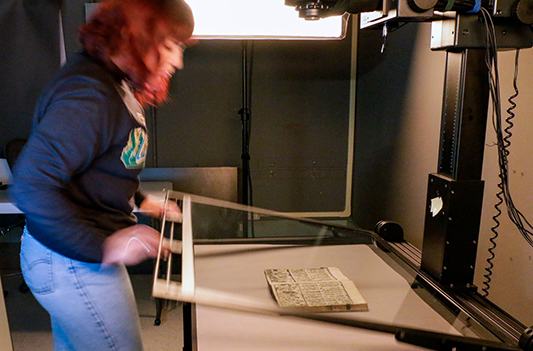How can the UC Berkeley Library help breathe new life into old materials?
Just ask Jonathan Zwicker.
Over the course of the fall semester, Zwicker and students from his Seminar in Classical Japanese Texts worked on translating and historically annotating a rare book from the Library’s collections.
The goal? To make a factually enriched translation of the book available online, where it can be used by scholars across the world.
The original book, digitized in Moffitt Library, is a travelogue by Japanese author Kyokutei Bakin, chronicling the people he met and the strange things he saw on his travels from Edo — modern Tokyo — to Osaka and Kyoto in the early 1800s. (One interesting thing he encountered? A robotlike mechanical crab that holds a sake cup, made to deliver rice wine to guests. Bottoms up!)

In researching and annotating the text, Zwicker and his students tied the book to other Library materials, such as 19th-century maps, to bring the work to life and provide historical and geographic context.
This project marks the first time the book has ever been translated and historically annotated.
“I didn’t actually have a definite idea of what I wanted to come out of (the project) other than that it would be somehow available online in some way — to leverage these new technologies to make what we were doing both open to people but also to show the interconnections between the different materials,” said Zwicker, associate professor in the Department of East Asian Languages and Cultures. “That’s, to me, the most interesting part of the book.”
Zwicker’s project is just one part of a broader collaborative effort guided by the Library that offers grants to help make educational resources openly available to students at UC Berkeley — and to scholars everywhere.
“Our program has a dual focus — first, on the creation of open textbooks to yield cost savings for students,” said Rachael Samberg, scholarly communication officer at the UC Berkeley Library, who is directing the effort, “and second, for other courses, it’s more about how incentivizing the creation of open books encourages pedagogically and scholarly innovative projects that benefit not just Berkeley students, but also researchers around the world.”
Zwicker said he hopes that going through the process of creating a new text will help provide a model for others who are pursuing similar projects. He’s already planning to pursue more projects like this one in the future.
And, he said, he couldn’t have done it without the support he received from the Library.
“It’s incredibly rewarding to feel that there’s this much enthusiasm for this kind of work and institutional support, and people are really — they’re not just providing help, but they’re also providing moral support,” he said. “And that’s invaluable.”